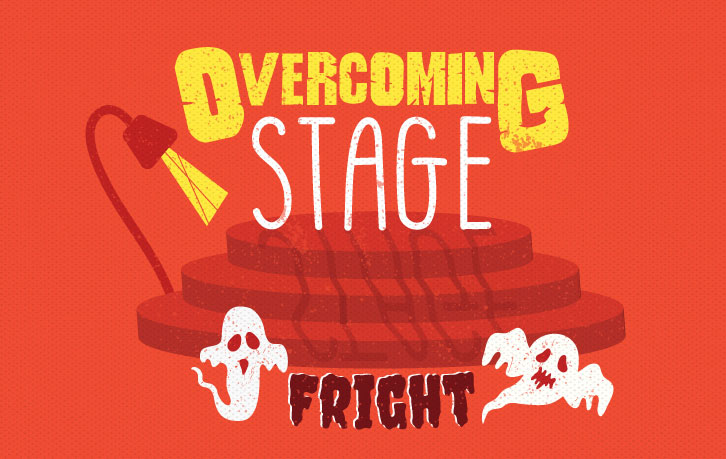
5 Steps to Overcoming Stage Fright
Stage fright and performance anxiety are perfectly normal phenomenons that occur in most people (to some varying degree). It can manifest as anxious jitters before a big performance, or, for some people, it can be so debilitating that it actually prevents you from public speaking, performing, presenting, and so on. We know stage fright can hit some people very hard, but we have some great tips on how to overcome performance anxiety that will help you get back out into the public eye (without the physical and emotional consequences of anxiety).
First of all it is important to understand what performance anxiety is, because it is very hard to overcome something that you don’t fully understand. Anxiety, in general, usually consists of excessive worry accompanied by either motor tension or restlessness (as outlined by Kaplan and Saddock’s introduction to psychiatry). By the way this is a book that every medical and psychology doctoral student has to read and learn, so I’d take their word that they know what they are talking about. In performance anxiety in particular, this worry takes your focus off of your presentation, speech, or whatever else you need to do in front of an audience, and drives your attention instead to your fears and worries. You are now no longer interested in how you are going to communicate your message, you are only interested in the fact that you are really scared of that communication, which only further exacerbates the anxiety.
So how can one overcome this? What are some tools for kicking anxiety’s butt?
Breathe and Relax Your Body
This may seem like an obvious piece of advice, but you’d be surprised how many people don’t know how to breathe correctly (in terms of breathing to achieve relaxation), and how many people just can’t sit still and relax. Mastering your breathing is an extremely powerful tool that can dramatically improve your quality of life (especially if you are an anxious person), but unless you are a professional singer, you might not be aware of how to breathe correctly to calm yourself down. Breathing to calm yourself must come from the diaphragm, and here is a great explanation from Dr. Alan Mandell on why breathing is important and how to breathe properly. I’d recommend watching all 3.5 minutes because this guy knows what he’s talking about!
Once you have mastered the art of breathing properly, which should cause you to feel more calm, you can take it one step further and do stretches and exercises to relax your whole body. Yoga is a great way to get rid of that extra bit of nervousness, and it leaves your body feeling amazingly refreshed afterwards. Doing yoga, or meditating, the night before a big presentation, or even the day of if time allows, could really help you get ready to go without the extra jitters clouding your experience.
Don’t Fight Your Stage Fright… Work With It!
This might seem a bit strange to those people who have debilitating anxiety, but if you don’t try to suppress it (which almost never works and ends up putting more of your attention and focus on your fear and anxiety), and, instead, you try to use it to your advantage, you could actually become successful in overcoming it. So how does one do this? Overcoming anxiety this way is rooted in a deep understanding of anxiety. You have to be aware that you have issues and problems in front of an audience, and then do what you can to make yourself feel that it doesn’t matter. One way people do this is to over prepare whatever it is that you are presenting. Regardless of your anxiety, if you feel like you are an expert at what you’re talking about you will start to focus less on your nervousness and more on your content and materials, not to mention that you will feel very comfortable with what you are speaking about, performing, or presenting. You’ll still have the anxiety, but you at least won’t be enhancing it by not feeling 120% prepared. When you feel like an expert, you can do anything! Don’t think it will work for you? Try it the next time you have to speak in front of a crowed and you might be surprised by how effective this method is.
Arrive Early
A common theme when dealing with anxiety is not to get rid of the anxiety, which is highly implausible, but to try to minimize your chances of exacerbating your anxiety. Even non anxious people can go crazy when they are late to important things, so don’t add that to your already heightened fear of performing and speaking in public. Arrive early, give yourself time to acclimate to your surroundings, get comfortable in the environment you will be performing in, and then take the remaining time to focus on your breathing and calming exercises. When you are at your venue try to only practice once or twice or you run the risk of exciting yourself to the point of agitating your fears and worries. Really use the time before your presentation to calm yourself down and BREATHE!
Practice as Much as Possible (before the big day)
There is nothing that could stop anxiety clear in her gripping tracks like feeling prepared. Again, it won’t eradicate the problem, but it also won’t enhance it and will make you feel more calm. Practice as much as you can before the day of your speech, performance, public speaking engagement, etc. Really know your stuff inside and out and use the practices to build your confidence. A large reason anxiety is so powerful is because people are genuinely lacking self confidence. Practice in front of family, friends, and loved ones,? and don’t shy away from their constructive criticism. These people care about you and want you to succeed, so listen to what they have to say because it will help you improve your performance. Once you’ve got it just right be confident in the fact that you know what you’re saying, and understand that you are just human and humans make mistakes. They happen… They suck but they happen, and if you are comfortable with that fact you won’t focus on a fear of messing up (which will, in the end, actually minimize the mistakes you make anyways).
Learn to Improvise
This is perhaps the best piece of advice for anyone who suffers from any degree of anxiety. Most anxiety stems from focusing on situations you think will happen, but let me tell you this… LIFE IS UNPREDICTABLE, and if you learn how to go with the flow, your anxiety will becoming less of a focus. So what if you forget a line? You can make up a new line. So what if you hit a wrong note? You are human and people know that no one is perfect. Plus they don’t care. You care, but your audience is usually just interested in seeing you or hearing what you have to say. If you lessen this fear of making mistakes and messing up, you are one step closer to getting over the fear itself. And if you aren’t still convinced then, when appropriate, include your audience in your anxiety. Tell them in the beginning you are a bit nervous, and you will feel an instant calm. If you preface your performance (when appropriate) with the fact that you are nervous two things can happen. 1) if you happen to mess up your audience will know it is because of nerves and will forgive you, or 2) you will have calmed yourself down enough that you will give a knock out, stellar performance, and then everyone will leave satisfied and you will feel like a winner. Whatever you have to do know that there are ways to overcome this dreaded anxiety.
Now that we have taught you some great tricks for overcoming stage fright (and anxiety in general), why don’t you create a presentation on something you love and are passionate about, and present it to your family and friends. Take the first step in getting your message out there without fear holding you back!
Latest posts by Jordana Pepper (see all)
- The Most Creative Teacher Is… - October 22, 2015
- How To Make Marketing Videos People Will Really Love & Share! - April 28, 2015
- Digital Marketing in 2015 - March 15, 2015
- 5 Steps to Overcoming Stage Fright - March 2, 2015






